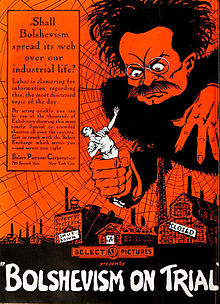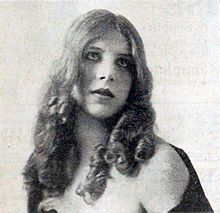Bolshevism on Trial
Bolshevism on Trial is a 1919 American motion picture drama made by the Mayflower Photoplay Company and distributed through Lewis J. Selznicks Select Pictures Corporation.
Barbara, a wealthy female socialite intent on reforming capitalism is lured into the Socialist cause by Herman, a Socialist agitator. Her concerned boyfriend Norman hears her lecture on the virtues of international socialism and is converted to her views. Prompted by Herman, she raises money among her wealthy friends to buy Paradise Island off the Florida coast to establish a collective colony, a society of happiness and plenty. Norman tries to raise money from his father and is rebuffed. His father expects Norman will benefit from the experience Hell get his island and a lesson along with it. When the wealthy colonists settled on their island, they elect Norman their Chief Comrade. They quickly discover that none of them has any worthwhile skills. Most identify themselves as assistant managers. Faced with disorganization, the colonists replace Norman with Herman, as the activist had long intended. He establishes a police force, abolishes marriage, and has the state assume ownership of the women and children. He imprisons Norman, which prompts Barbaras epiphany The poor deluded people will starve and die as they are in Russia. She rejects Hermans advances and Normans father arrives at the head of a Navy fleet to save the day. Norman lowers the Red flag and raises the American flag to general cheers.The films advertising called it the timeliest picture ever filmed and reviews were good. Powerful, wellknit with indubitably true and biting satire, said Photoplay. As a promotion device, the April 15, 1919, issue of Moving Picture World suggested staging a radical demonstration by hanging red flags around town and then have actors in military uniforms storm in to tear them down. Then distribute handbills to the confused and curious crowds assuring them that Bolshevism on Trial takes a stand against Bolshevism and you will not only clean up but will profit by future business. When this publicity technique came to the attention of U.S. Secretary of Labor William
Source: Wikipedia


